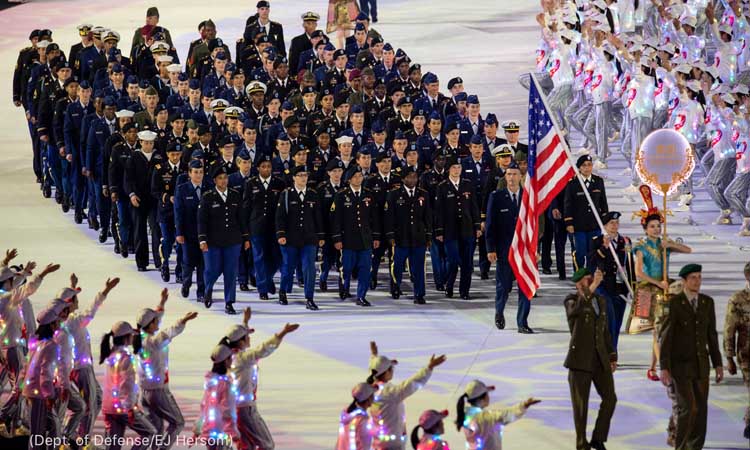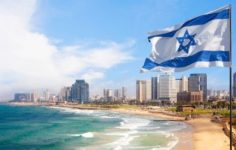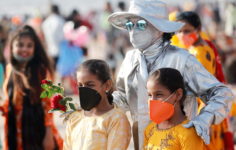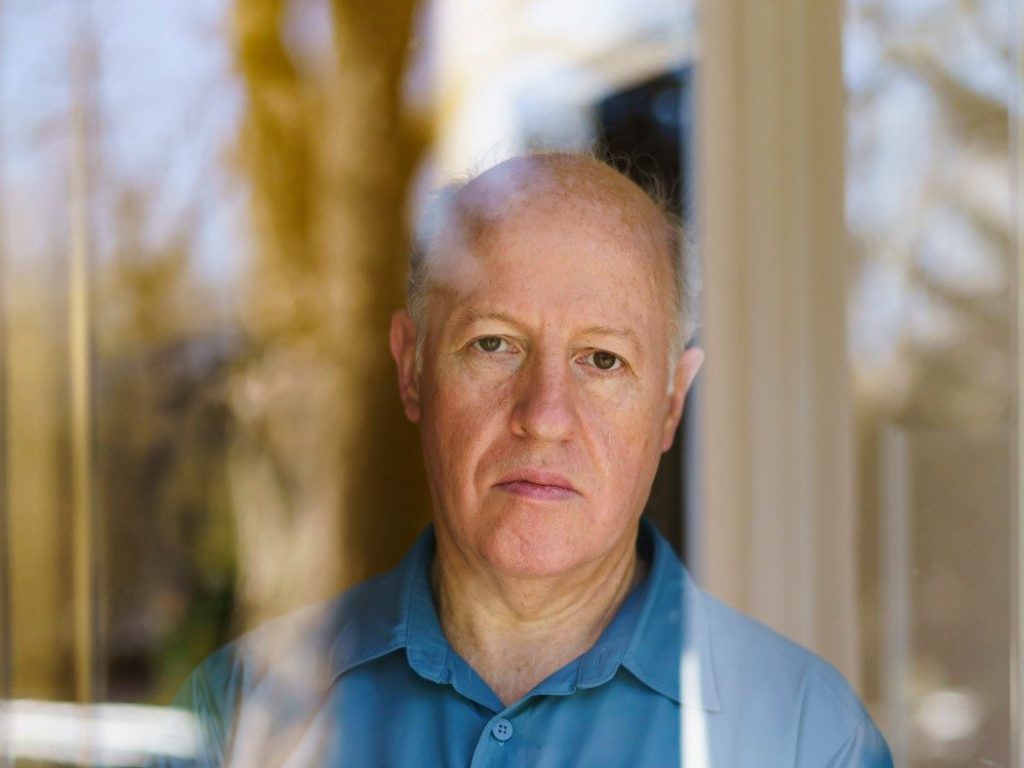More athletes have revealed that they fell ill during the Military World Games in October when the Chinese city of Wuhan hosted the event months before the COVID-19 outbreak.
Taking place in October, the allegations came two months before the first identification of COVID-19 by China.
Close to 10,000 competitors competed at the Games from over 100 countries during the nine-day event.
Speaking to the Mail on Sunday, German volleyball player Jacqueline Brock alleged that she got COVID-19 despite no cases being reported until December.
She said: “After a few days, some athletes from my team got ill, I got sick in the last two days.
“I have never felt so sick, either it was a very bad cold or COVID-19, I think it was COVID-19.”

It comes after French pentathlete Elodie Clouvel claimed she and her partner Valentin Belaud contracted the virus at the Games.
En Or 🥇 @Gendarmerie @SportsDefense #armeedechampions #Wuhan2019 #WorldMilitaryGames pic.twitter.com/CkDAkDBmix
— ÉLODIE CLOUVEL (@Eloclouvel) October 24, 2019
Italian fencer Matteo Tagliarol also said everyone in his apartment in the city fell ill with symptoms “that looked like those of COVID-19”.
Luxembourg triathlete Oliver Gorges said he fell ill with a flu and is now to undergo an antibody test this week to see if he has COVID-19.
He claimed that Wuhan was a “ghost town” when he went for a cycle in the city, while also saying that he had his temperature recorded on arrival at the airport while athletes were told to wash their hands when entering the canteen.
However, Swedish pentathlete Melina Westerberg said that many of her compatriots were sick at the Games, but none tested positive for the virus claiming: “It was just a coincidence, we all felt safe.”
insidethegames has contacted event organisers the International Military Sports Council for a response.
Diane Francis: Canadian Forces have right to know if they got COVID at the 2019 Military World Games in Wuhan
Jun 25, 2021 • June 25, 2021 • 4 minute read •
This week, lawmakers in the United States called for an investigation into whether the October 2019 Military World Games in Wuhan, China was a COVID-19 super-spreader event and whether officials should have known something was amiss, given that the city seemed unusually empty and was described by some participants as a “ghost town.”
Canada’s Parliament should do the same, according to some Canadian Armed Forces (CAF) members who participated in the Games and came back with COVID-like symptoms that military officials seemingly ignored. Canada sent around 180 military athletes and support personnel to the Games, out of a total of 9,000 athletes from 100 countries.
The Games were held in October, but China did not disclose the virus to the world until the end of December.
Two Canadian military sources, who asked for anonymity because they are currently serving in the Canadian Armed Forces, said the military bureaucracy ignored their symptoms and also suggested China was covering up an outbreak months before it admitted COVID existed.
“This was a city of 15 million people that was in lockdown,” said a source who participated in the Games. “It was strange, but we were told this was to make it easy for the Games’ participants to get around.”
He said he got “very sick 12 days after we arrived, with fever, chills, vomiting, insomnia.… On our flight to come home (at the end of October), 60 Canadian athletes on the flight were put in isolation (at the back of the plane) for the 12-hour flight. We were sick with symptoms ranging from coughs to diarrhea and in between.”
After returning to Canada, the source said family members became ill and his symptoms worsened, including fatigue, nosebleeds, fever and pain when he breathed. He went to a military doctor. “I was tested for various issues, but never for anything respiratory,” he said. “A few weeks later, I offered to take an antibody test but was ignored.”
Many American participants got sick with COVID-like symptoms, as well. According to the Washington Post, U.S. military leaders at the time either dismissed the idea out of hand or weren’t aware of it.

“Given unanswered questions surrounding the origins of the pandemic, information involving the health of service members who participated in the 2019 Games could provide key evidence in understanding when COVID-19 first emerged,” said Rep. Mike Gallagher in calling for the investigation.
A second Canadian military source who spoke to the National Post said, “One-quarter of us got sick, there and when we returned. Some were bedridden for weeks. This made us potential vectors for the virus. The military did nothing. I was sick and others were, too, with Wuhan symptoms. … I was eventually given a swab test, which measures only recent exposure, and told to carry on.”
Then, on Jan. 22, 2020, the Canadians who participated in the Wuhan Games received a letter from the Surgeon General saying it was “not aware of any” COVID-19 among participants and that, “Your individual risk of having been exposed to 2019-nCoV during temporary duty in Wuhan City … is negligible.”
“How did they know?” asked the Canadian Forces officer. “I would have thought the intelligence or medical intelligence community would have tested and followed up on this, but this didn’t happen. Athletes were coming back sick from countries, with ongoing symptoms. In Europe, athletes were tested and French, Italian and six Spaniards returned and were positively identified in 2019-20 as having the virus.”
The Post contacted the Surgeon General’s office and Julia Scott, a communications advisor with the Canadian Forces Health Services Public Affairs Department, responded by email, saying, “We are not aware of any CAF members or civilians becoming sick at the Games or after they returned. There have not been any COVID-19 cases identified amongst this group.
“As their stay in Wuhan was well before COVID-19 pandemic was declared and before anyone was aware of the virus, members were not tested upon their return. Testing for COVID-19 was not available in Canada prior to January 2020. …
“Once we were aware of potential risks, the CAF and Department of National Defence took immediate precautionary measures to avoid any illness or additional exposure to CAF members related to the novel coronavirus.”
One of the sources described the Surgeon General’s letter as a “slap in the face” and said it did “zero follow-up with any of us since.” He added that now it is too late for an antibody test to determine whether they had COVID or not at the time, because they have now been fully vaccinated. “I think this is worth an inquiry,” he said.
Parliament must determine what, if anything, the Armed Forces, as well as the Public Health Agency of Canada, did to protect these people or the public. This would also shed light on the extent of China’s cover-up of the origins of COVID-19 and the date of the disease’s inception.
National Post
With the 7th Military World Games about to close, the “Olympics for military” is set to leave the host city and the world rich legacies.
By Xinhua writers Wu Zhi, Wang Meng
WUHAN, Oct. 26 (Xinhua) — From world-class sporting facilities and improved infrastructure to a message of peace carried beyond matches and a new culture of volunteering, the legacy created by the 2019 Military World Games is evident as the top international multi-sports event for soldiers draws to a close in a day.
The 7th Military World Games will mark the history of military competitions and develop new practices in the future, said Herve Piccirillo, president of the International Military Sports Council (CISM) in an interview with Xinhua, lauding its material and spiritual legacies to the host city Wuhan and the world.
A view of the opening ceremony of the 7th International Military Sports Council (CISM) Military World Games in Wuhan, capital of central China’s Hubei Province. (Xinhua/Li Ga)
Much like the Olympics, the Military World Games have brought together military athletes from around the world every four years since the Games’ inauguration in Rome in 1995 to celebrate the end of World War II. 2019 is the first time that China has hosted the Games.
The 2019 Games kicked off in the central Chinese city of Wuhan on Oct. 18 with a grand ceremony attended by President Xi Jinping, who said in a meeting with foreign military officers the same day that he hoped the power of sports would dispel the shadow of war and foster communications between different cultures.
BIG SPORTS EVENTS
“It feels like the Olympic Games, and the guys who have been to Olympics also said this,” said Latvian athlete Laura Vike.
The 2019 Military World Games have the largest numbers of athletes and sports in history. Nearly 10,000 soldiers from 109 nations are competing for 329 gold medals in events from football, swimming, and basketball to parachuting, aeronautical and naval pentathlon.
Cheng Fengxuan (R) of China and Laureiro Luis Enrique Manrique of Spain compete during the men’s individual obstacle race of naval pentathlon at the 7th CISM Military World Games in Wuhan, capital of central China’s Hubei Province, Oct. 23, 2019. (Xinhua/Liu Jinhai)
The size of the host city, as well as its diversified terrain and abundant water resources, made it possible for all the competitions to be held within one city, where 35 sports venues were built or renovated to meet international standards. A 30-building village was built to accommodate the athletes and coaches.
The Games are open to the public, instead of being limited to barracks. More than 600,000 tickets had been sold, according to the Games executive committee, with men’s basketball, women’s volleyball, swimming and diving having the highest demand.
Frankline Tonui (up, R) of the United States competes in the men’s 3,000m steeplechase preliminary round at the 7th CISM Military World Games in Wuhan, capital of central China’s Hubei Province, Oct. 22, 2019. (Xinhua/Wang Lili)
Eighty-two records of CISM affiliated events have been rewritten in the 2019 Games by the eighth day, said Piccirillo, largely thanks to the infrastructure, the mobilization of volunteers and the passion of the Chinese people that also set new records.
He said what has been done for the Wuhan Games will serve as an inspiration for future games.
Italian archer Roberto Punzo, who had lost walking ability due to spinal cord injury in a United Nations peacekeeping mission in 2006, said that as a soldier with disability, he longed for peace more than anyone else and that soldiers are supposed to maintain peace, but not to bring wars.
“This is my understanding of the message carried by the Military World Games,” he added.
Herve Piccirillo (L), president of the International Military Sports Council (CISM), lights the torch during the 7th CISM Military World Games Torch Relay in Wuhan, capital of central China’s Hubei Province, Oct. 16, 2019. (Xinhua/Xiao Yijiu)
Peace and friendship are the words that came to officials and athletes when they described this year’s Games.
“It is an opportunity to pass messages of friendship and peace, which will be relayed in these 109 countries, even elsewhere,” said Piccirillo. “So, there is an intangible heritage of values.”
Piccirillo believes that the CISM made a wise and meaningful decision to choose China as the host of the 7th World Military Games in 2015. “We made the decision because of the great contribution that China had made to the peace of the world and the country’s willingness to spread friendship through sports,” he added.
“The Chinese soldiers have shown great strength and abilities through the medals that they won. Hopefully, China can make a greater contribution to world sports and world peace in the future,” said CISM secretary-general Mamby Koita.
Located at the conjunction of the Yangtze and Han rivers in China’s central heartland, Wuhan is using sports as a way to put itself on the global map.
Wuhan, traditionally known as the ‘Oriental Chicago’, played an important role in China’s economic and cultural history due to its central location. Now the city of 10 million is becoming an economic powerhouse, thanks to its fast-growing automotive industry, high-tech industries and trade links.
Photo taken on Sept. 30, 2019 shows the light show in Wuhan, capital of central China’s Hubei Province. (Xinhua/Xiong Qi)
Economic and social progress has enabled Wuhan to host top-level global sports gatherings such as the Military World Games and the Wuhan Open, a WTA Premier 5 event, said Zhu Jianbin, chairman of the Wuhan Sports Development Investment Company.
He believes these sports events will, in turn, help Wuhan attract global attention and boost its internationalization drive.
Before the Military World Games opened, mayors of 15 cities worldwide had sent greetings and well wishes to Wuhan. Among them, Zsolt Borkai, mayor of Gyor, Hungary said: “As a former soldier and Olympic champion, I’m aware of what this event means for a city… and what kind of message it sends to the sports world and the athletes.”
Pol. Gen. Aswin Kwanmuang, governor of Bangkok, said he was confident that the Military World Games would contribute to Wuhan’s “strong status as a hub for international events and lively cultural scenes.”
Since taking the CISM flag from Mungyeong, South Korea in 2015, Wuhan has devoted great efforts to make sure the 2019 Military World Games would be a great success and provide a long-term legacy for local residents.
Sustainability is a core value that the Games executive committee has tried to embody. Most of the sports venues are located near residential areas or at universities and will be open to citizens and students after the Games.
Photo taken on Oct. 16, 2019 shows a view of the welcome center at the athletes’ village of the 7th CISM Military World Games in Wuhan, capital of central China’s Hubei Province. (Xinhua/Wang Peng)
It’s good news for Lou Luchen, an amateur swimmer living in a northwest district of Wuhan with a population of 600,000, which until now, lacked modern sports facilities.
“In the past, I either spent a long time traveling to swimming pools in other districts or just swam in the Han river, which is quite dangerous in flood seasons,” Lou said.
However, Lou and his friends will soon be able to jump into the water in the Five Rings Sports Center, a world-class arena near his home built for track and field, lifesaving and table tennis competitions at the Military World Games.
The Military World Games will also leave Wuhan with huge benefits from infrastructure improvements, new subway lines, and environmental upgrades. Over the past three years, the city renovated 1,300 kilometers of its urban roads and saw its metro network reach 330 kilometers in total length. Meanwhile, a total of 360,000 trees were planted.
A view of the athletes’ village of the 7th CISM Military World Games in Wuhan, capital of central China’s Hubei Province. (Xinhua/Xiong Qi)
Thanks to the Games, Wuhan has over 1.45 million registered volunteers now, which means there is one volunteer for every eight citizens.
All these facilities and assets are expected to provide Wuhan with a big edge for its bid for more international sports events.
“We also have about 20 military world championships a year, so we hope to come back in Wuhan for our military world championships,” said Koita.
(Xinhua reporters Yu Pei and Yue Wenwan also contributed to the story.)■









